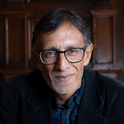Lists often say more about those who draw them up than they do about the real world. If this list had been drawn up by the women's pages of the Guardian, there would have been many more women. The London Review of Books would have looked more favourably on the smouldering embers of the theory revolution and the new left. Le Monde would have included more French thinkers and so on.
This list is, in part, a reflection of the preoccupations of the Anglo-American centre at a particular moment. Some might argue that the compilers have bent over backwards to include thinkers from outside the west. After all, a list based on more "objective" measurement of intellectual achievement—Nobel prizes, academic citations and so on—would have seen an even greater tilt to the west. Would there have been so many Africans and Arabs ten years ago? Is this a consequence of 9/11? Is it bad conscience or plain bad thinking? Or is it an honest attempt to do justice to ideas that are under-represented by a western media focused on the English-speaking world? (Within the west both Japan and eastern Europe/Russia are oddly under-represented.)

A huge number of names come from the US and Britain. Almost a third are American citizens; one in seven are British. However the real story is not about nationality: almost half these people live in the US. Wherever you look in the intellectual culture—from DNA and AI to the new novels by Rushdie and Zadie Smith, from literary theory to economics—America is where the action is. In Britain, most of the names come from Oxbridge and London. In the US, from the northeast, from Washington DC to Harvard and MIT. Europe has become America's intellectual poor relation. Not only are there relatively few European names, the quality is dubious. Too many of the names rest on old laurels, or are quirky (Negri? Sloterdijk? Zizek?). The almost complete disappearance of Paris as a centre of global ideas is most striking of all. For over 30 years, from Sartre and de Beauvoir to Barthes and Foucault, Paris was one of the world's intellectual capitals. That age has gone. The great names have died, the grand ideas are out of fashion. Paris has only a handful of representatives.
Even more striking is how male the list is (there are just 10 women on it). As worrying as the omissions are the names of the women who made the list: Klein, Scarry, Kristeva (surely a figure from the distant past?). This partly reflects the dominance of the male world of strategic studies and policy institutes. But where is the new generation to replace Juliet Mitchell, Jane Jacobs and Nadine Gordimer?
Also under-represented are the sciences, especially medical sciences. This again may say more about the compilers than the compiled. Too many names are from political and economic debate; too few from labs and research institutes. Have the great advances in cognitive science, molecular biology and cosmology been fairly reflected?
The other great story behind this list is the decline of the left. No list in the 20th century would have featured so few socialists or communists. Thirty years ago such a list would have looked dramatically different, regardless of who was compiling it. Not only are there few names here from the traditional left, but many of those who are there are well past 70: Hobsbawm, Habermas, Chomsky. There are similarly few names from the right, old or new. The old labels no longer work. How would we define Eco, Hitchens or Ignatieff? Battles over Kosovo, Afghanistan and Iraq, the continued repercussions of 1989/1991 and the defeat of trade unions and the left over economic strategy throughout the west have shaken up not just the left but the whole ideological landscape.
Marx is not the only big loser here. Freud too is vanquished. Not just Freud, but the entire spectrum of psychology, psychoanalysis and psychiatry. Thirty years ago, such a list would have included Laing and Szasz, Anna Freud, Lacan and Lionel Trilling. Now Howard Gardner and Daniel Kahneman are the only two psychologists. What has happened? Perhaps they have been replaced by the cyber philosophers of whom there are at least three.
With Freud and Marx gone, what is left of the theory revolution? Outside the academy, virtually nothing. Ageing paperbacks full of long, incomprehensible words. No Homi Bhabha or Gayatri Spivak, no Hartman, Bloom or Fish. Baudrillard, Eco, Gates, Paglia and Slavoj Zizek are the last spear-carriers, and what a strange crew they make. Philosophy, too, has been routed. Dennett, Habermas, Nussbaum, Rorty, Singer and Walzer. Four from the American northeast. Again, such a list would have been inconceivable at almost any time in the 20th century.
This list suggests a transformation in the notion of the public intellectual. For almost a century, from Zola and Freud to Chomsky and Said, the public intellectual wrote prolifically, championed unpopular causes and was often linked to the revolutionary left. In his 1993 Reith lectures, the late Edward Said spoke of "The Representations of the Intellectual." His pantheon included all the great names: Gramsci and Benjamin, Russell and Sartre. Interestingly, he mentioned no one born after 1935 (except for a footnote quoting Christopher Hitchens). Said sensed that the great tradition of the oppositional intellectual was coming to—had come to?—an end. He was the last survivor. This list suggests that Said was right.?
Click here to vote












